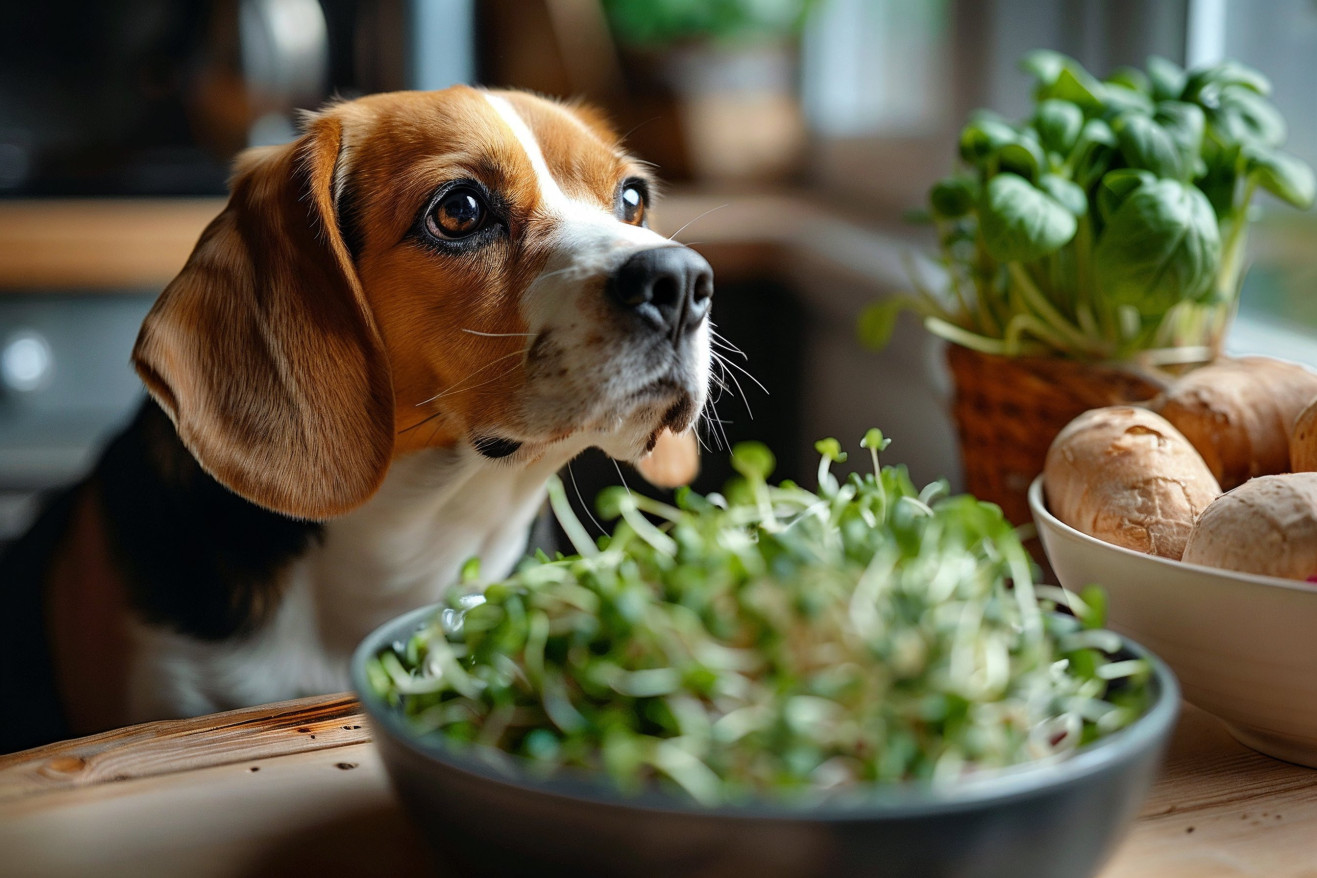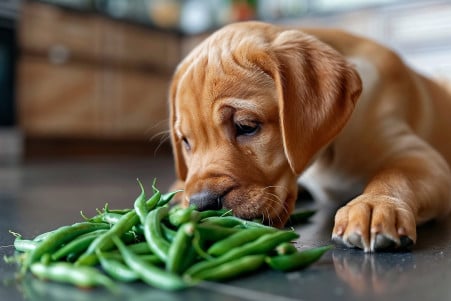Can Dogs Eat Bean Sprouts? Nutritional Guidelines for Pet Owners
28 February 2024 • Updated 27 February 2024

If you’re a pet owner who loves to eat your greens, you may be wondering if you can share your favorite veggies with your dog, including whether or not dogs can eat bean sprouts. The good news is that dogs can have bean sprouts in moderation. They’re a nutritious snack that’s full of vitamins and fiber.
That said, it’s important to add them to your dog’s diet slowly to avoid digestive issues and to make sure they’re cooked to avoid bacterial contamination.
This article will review the latest veterinary and dog nutrition research to help you better understand the best ways to add bean sprouts to your dog’s diet. It will focus on the nutritional value, potential downsides, and how to do it safely.
With this information, you can feel confident that you’re making the right choices when it comes to adding this veggie to your dog’s meals, which will help you keep them healthy and happy.
Can dogs eat bean sprouts?
The Health Benefits of Bean Sprouts for Dogs
Bean sprouts offer more than just a satisfying crunch for your dog; they’re also packed with essential nutrients. For example, bean sprouts are a great source of vitamins like C, A, and E, all of which are important for your dog’s health.
Vitamin C is an antioxidant that’s important for the immune system, according to DogTime. Vitamin A supports healthy cell growth and reproduction, and according to Rover.com, vitamin E is important for fat metabolism and protecting the body from free radicals.
Fiber is another important nutrient found in bean sprouts. According to The Canine Nutritionist, fiber is important for maintaining a healthy gut, which is essential for good health. Together, these nutrients make bean sprouts a healthy addition to your dog’s diet, supporting the immune system, cell health, and overall digestive health.
That said, it’s important to add bean sprouts to your dog’s diet carefully, just as you would any new food. Introduce them slowly and make sure they’re clean and prepared properly to avoid digestive issues and ensure your dog’s diet is as healthy and balanced as possible.
Risks to Consider: Can Dogs Eat Bean Sprouts?
While bean sprouts can offer some health benefits to dogs, there are also some risks to consider. According to Dope Dog, dogs have shorter digestive tracts than humans, so they may not be able to tolerate high-fiber foods like bean sprouts as well as people.
If you introduce sprouts too quickly or feed them in large quantities, it can cause digestive upset, such as gas and diarrhea. There is also a risk of allergies, and if your dog is allergic to bean sprouts, they may experience symptoms like itching or gastrointestinal upset.
A more serious concern is the risk of bacterial infection. According to A-Z Animals, raw bean sprouts can be contaminated with bacteria like salmonella and E. coli. If a dog eats contaminated sprouts, it can result in food poisoning, which can cause symptoms like vomiting, diarrhea, and lethargy, and in severe cases, more serious symptoms.
To reduce the risks of feeding bean sprouts to your dog, make sure to wash and cook the sprouts before giving them to your pet. Start with small amounts and watch your dog for any signs of digestive upset or allergic reactions. This way, you can make sure that bean sprouts have a positive impact on your dog’s health without the risks outweighing the benefits.
How to Balance Your Dog’s Diet: Vegetables and Canine Nutrition
Dogs are members of the order Carnivora, but they are classified as omnivores, which means they can get nutrients from both animal and plant sources. According to VCA Animal Hospitals, dogs have evolved to use proteins and fats as their main sources of energy and can also digest carbohydrates from plants, which are more easily digestible when cooked. This is why it’s important to include vegetables in their diet.
Vegetables, including bean sprouts, offer nutrients that aren’t typically found in meat, including vitamins and fiber. This helps ensure that dogs have a well-rounded diet that includes a variety of nutrients that are important for their overall health.
In line with the standards of the Association of American Feed Control Officials, as outlined by PetMD, bean sprouts can be part of a dog’s diet to ensure that it meets the nutritional requirements of commercial pet foods.
That said, every dog is different and has different dietary needs, which can be influenced by factors such as age, size, and how active they are. It’s important to make sure that a dog’s diet meets their specific needs.
This means that you should make sure that you’re including vegetables like bean sprouts in a way that ensures that their diet meets their specific nutritional needs, as recommended by WebMD, so that they can stay as healthy and active as possible.
Sprouting: Increasing Nutritional Value for Dogs
The nutritional value of beans and other seeds is significantly increased when they are sprouted, and the process of sprouting has been recognized for its health benefits in both human and dog diets. A review published in PMC found that sprouting legumes increases free amino acids, simple sugars, and bioactive compounds, while decreasing antinutritional factors such as phytic acid. In dogs, this could lead to better nutrient bioavailability and digestibility.
If you are adding sprouted beans to your dog’s diet, it’s important to follow proper transitioning protocols. The American Kennel Club recommends a 5– to 7-day transition period, with the first day consisting of 25% new food and 75% old food, and the seventh day consisting of 100% new food. This slow transition helps to prevent stomach upset and makes it easier to monitor your dog for any adverse reactions.
Healthline also points out that sprouted grains and legumes have more nutrients and are easier to digest, which could mean that dogs get more nutrition and energy from their food. That said, pet parents should be careful and make sure that sprouts are cooked thoroughly to avoid bacterial contamination, which is consistent with the overall goal of feeding a well-balanced and safe diet to dogs.
Dog Digestive System: How Dogs Digest Plant-Based Foods Like Bean Sprouts
Despite their omnivorous diet, dogs digest plant-based foods like bean sprouts less efficiently than humans. According to a study in ScienceDirect, the domestic dog has evolved from its carnivorous ancestors to have a generalist dentition and flexible taste system that leans toward an omnivorous diet. This means that dogs can digest and absorb nutrients from both animal and plant sources, but they are less efficient at doing so with plant sources.
The natural feeding behavior of dogs is similar to that of wolves, with dogs preferring larger, less frequent meals, but domestication has led to a more varied diet, according to a study in PMC. When properly prepared, dogs can digest bean sprouts, which can provide them with additional vitamins and fiber that are less prevalent in meat.
The fact that bean sprouts are part of a dog’s natural diet suggests that while meat should be the main part of their diet, vegetables like bean sprouts can be a helpful nutritional addition. Recognizing the value of plant-based foods in a dog’s diet can help pet owners take a more holistic approach to their pet’s nutrition.
Final Thoughts on Giving Your Dog Bean Sprouts
To sum up, bean sprouts can be a healthy and nutritious addition to your dog’s diet if they are introduced and fed to your dog properly. They are full of vitamins and fiber that can help your dog’s health in a number of ways. That said, it’s important to stress the importance of feeding them in moderation, introducing them slowly, and cooking them to avoid potential digestive problems and bacterial contamination.
When fed as part of a well-rounded diet, bean sprouts can help your dog get the nutrients they need. Sprouting them can help make the nutrients in bean sprouts more digestible and bioavailable. That said, every dog is different, and what works for one may not work for another. As a result, it’s important to monitor your dog’s reaction to bean sprouts and adjust their diet as needed.
It’s a good idea for dog owners to talk to a vet, especially if they are going to make any major changes to their dog’s diet. A vet can offer personalized advice based on your dog’s specific health concerns and needs, helping to ensure that they get the nutrients they need in a way that is safe and effective.
Bean sprouts can be a part of this equation, helping to ensure that your dog is happy, healthy, and well-fed.


